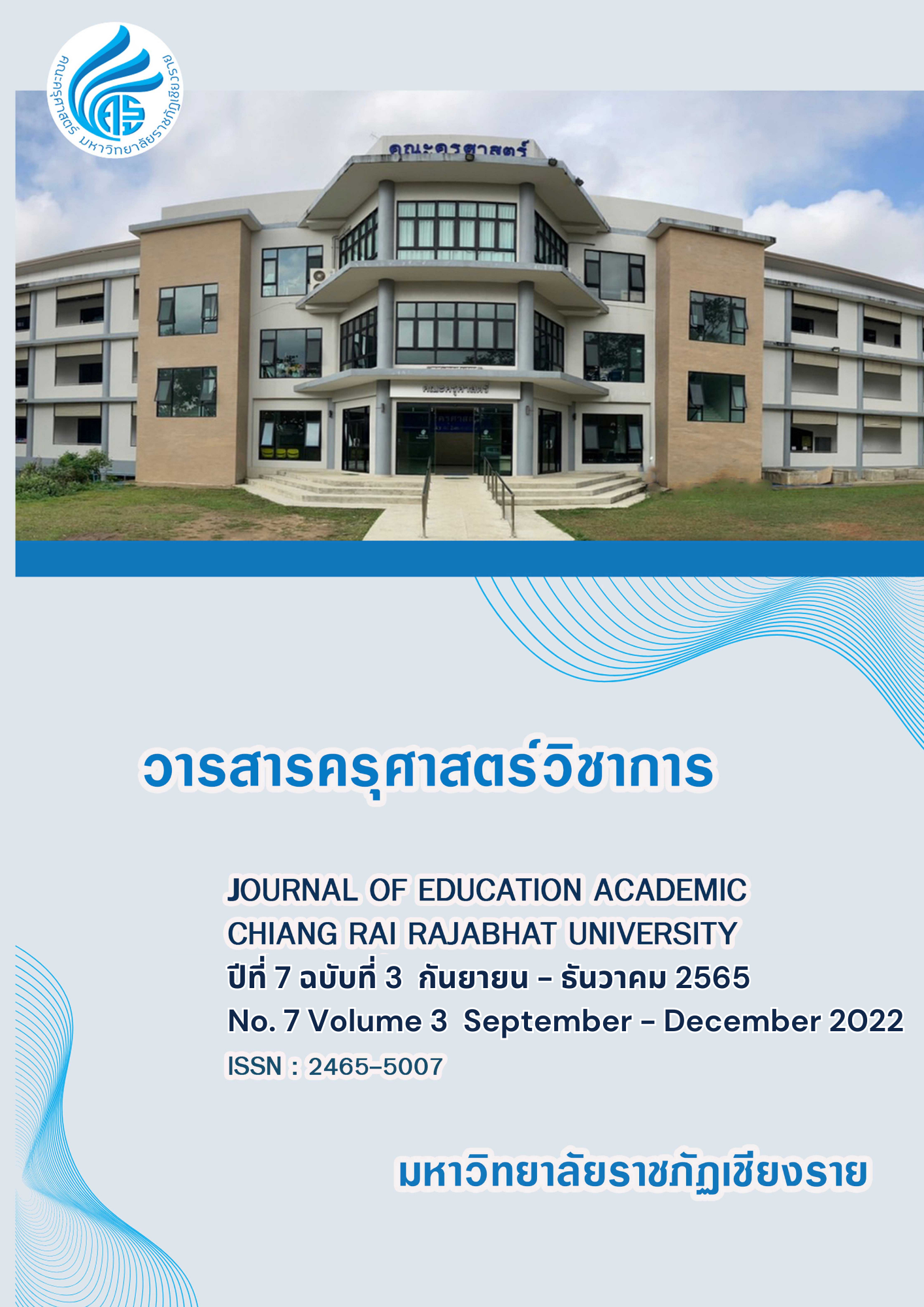A Study of School Directors’ Leadership Styles: A Case Study of the School Academic Principals in Chiang Rai Province
Keywords:
Leadership Behavior, Leader Traits, Leadership StylesAbstract
A study of school directors’ leadership styles: a case study of the school academic principals in Chiang Rai province aimed to study 1) the leadership behavior of the educational institute administrators in the position of the school director, and academic Director in Chiang Rai. 2) the leadership characteristics of educational institution administrators, in the position of educational institution director, and academic Director in Chiang Rai.3) the leadership styles of school administrators in a case study of the school academic directors in Chiang Rai by using the methodology of qualitative research. In the research, the semi-structured interview was utilized in order to collect the information on administrators of educational institutions in the case study of 4 academic directors in Chiang Rai Province and 12
co-researchers, including the deputy directors, supervisors and teachers and was analyzed and summarized the key points to confirm the findings of leadership styles from 12 experts and to compile it to be more accurate in a descriptive presentation. The results revealed that:
1. Leadership behavior of the administrators in the position of an academic director in Chiang Rai included 5 aspects as follows: 1) management capability, 2) personnel officers support, 3) decision-making and problem solving skills, 4) persuasion or motivation skills, and 5) initiative creativity.
2. Leadership traits of the administrators in the position of an academic director in Chiang Rai consisted of 5 aspects including 1) intelligence, 2) emotional intelligence, 3) success-oriented personality, 4) social relations, and 5) moral and ethical behavior.
3. Leadership styles of the administrators in the position of an academic director in Chiang Rai was found that there were two types of leadership styles including 1) Academic Leadership and 2) Transformational Leadership as follows:
Academic Leadership obtains behaviors and characteristics of a leader who holds visions, develops achievements, follows up evaluation, invents advanced technology, strengthens networks towards professional goals, inspires teachers, and mainly focuses on the learners.
Transformational leadership has the behavior and attributes of a leader who behaves as a good role model, achieves management vision, enhances methods of development, improves all the fields of work in the organization, understands and accepts differences, stimulates the creation of educational ideals, disseminates philosophy, and develops educational institutions to acquire accomplishment.
References
กระทรวงศึกษาธิการ. สำนักงานคณะกรรมการข้าราชการครูและบุคลากรทางการศึกษา. (2564). คู่มือการดำเนินการตามหลักเกณฑ์และวิธีการประเมินตำแหน่งและวิทยฐานะข้าราชการครูและบุคลากรทางการศึกษา ตำแหน่งผู้บริหารสถานศึกษา. (น. 107-112). ม.ป.ท..
กัลยมน อินทุสุตและศิริชัย ชินะตังกูร. (2554). ความฉลาดทางอารมณ์ของผู้บริหารสถานศึกษาขั้นพื้นฐาน. วารสารการบริหารการศึกษา มหาวิทยาลัยศิลปากร. 2(1), 25-42.
ชัยเสฏฐ์ พรหมศรี. (2561). ภาวะผู้นำสำหรับผู้บริหารองค์การ : แนวคิด ทฤษฎีและกรณีศึกษา. กรุงเทพฯ ปัญญาชน.
พรพรรณ ใจกำแหง. (2561). การสังเคราะห์งานวิจัยเกี่ยวกับภาวะผู้นำของผู้บริหารสถานศึกษา. (วิทยานิพนธ์ครุศาสตรมหาบัณฑิต). จันทบุรี: มหาวิทยาลัยราชภัฏรำไพพรรณี.
พูลย์ชัย ยาวิราช. (2553). การพัฒนารูปแบบการนำนโยบายสู่การปฏิบัติ สำหรับสถานศึกษาขั้นพื้นฐาน. วารสารการวิจัยกาสะลองคำ มหาวิทยาลัยราชภัฏเชียงราย. 4(1), 19.
ภารดี อนันต์นาวี. (2555). หลักการ แนวคิด ทฤษฎีทางการบริหารการศึกษา. (พิมพ์ครั้งที่ 4). ชลบุรี: มนตรี.
ภิรญา สายศิริสุ. (2561). ภาวะผู้นำเชิงนวัตกรรมของผู้บริหารในโรงเรียนมัธยมศึกษา กลุ่มสหวิทยาเขตปัญจภาคี สังกัดสำนักงานเขตพื้นที่การศึกษามัธยมศึกษาเขต 4. (ปริญญาศึกษาศาสตรมหาบัณฑิต). มหาวิทยาลัยเกษตรศาสตร์.
วรัญญา ทิวาวงษ์. (2558). ความสัมพันธ์ระหว่างภาวะผู้นำการเปลี่ยนแปลงกับกระบวนการคิดสร้างสรรค์ในสถานศึกษาของผู้บริหารและครูสังกัดสำนักงานเขตพื้นที่การศึกษาประถมศึกษาสระบุรี. (วิทยานิพนธ์ครุศาสตรมหาบัณฑิต). ลพบุรี: มหาวิทยาลัยราชภัฏเทพสตรี.
สถาบันพัฒนาความก้าวหน้า. (2553). ยุทธศาสตร์การพัฒนาวิชาชีพผู้บริหารสถานศึกษาตามหลักเกณฑ์ใหม่. กรุงเทพมหานคร: เอส.พี.เอ็น. การพิมพ์. 188.
สุธาสินี เพชรกระจ่าง. (2559). พฤติกรรมผู้นำของผู้บริหารสถานศึกษากับความผูกพันต่อองค์การของครู สังกัด สำนักงานเขตพื้นที่การศึกษาประถมศึกษาสมุทรสงคราม. (ศึกษาศาสตรมหาบัณฑิต). มหาวิทยาลัยศิลปากร.
อำไพ อินทรประเสริฐ. (2545). ศิลปะการเป็นผู้นำ. กรุงเทพฯ: เสมาธรรม.
Hoy, K. and Miskel, G. (2001). Educational Administration: Theory, Research and Practice. New York : Mc Graw - Hill.
Philip Hallinger and Joseph Murphy. (1985). Assessing the instructional management behavior of principal. The Elementaly School Journal. 86(2), 221-224.
Downloads
Published
Issue
Section
License
Copyright (c) 2022 Journal of Education Academic Chiang Rai Rajabhat University

This work is licensed under a Creative Commons Attribution-NonCommercial-NoDerivatives 4.0 International License.






